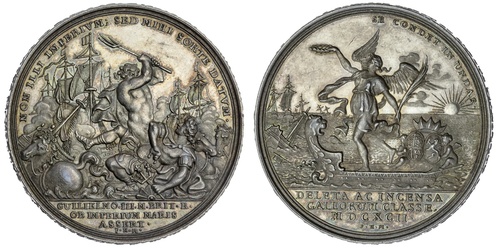
Auction: 22007 - British and World Coins and Commemorative Medals Autumn Auction
Lot: 758
Battle of La Hogue, AR Medal, 1692, by P. H. Müller and F. Kelinert, NON ILLI IMPERIVM; SED MIHI SORTE DATVM •, Neptune, with raised trident, drives Louis XIV from his marine care; beyond, a naval engagement, GUILIELMO • III • M • BRIT • R • OB IMPERIUM MARIS ASSERT • in exergue in three lines, rev. SE CONDET IN UNDAS •, Victory standing upon an antique galley; beyond, sun setting over shipwrecks, DELETA AC INCENSA GALLORUM CLASSE, MDCXCII • in exergue in three lines, C
After the major defeat in the battle of Beach Head, Queen Mary, acting as Regent, had immediately ordered a complete refit of the English fleet, thus ensuring that the Maritime powers could put a formidable force to sea by 1692. In April 1692 it became known in London that Louis was assembling a major force on the Channel coast for the invasion of Britain. The Allied fleet numbered almost one hundred ships and was armed with seven thousand cannon and crewed by around forty thousand sailors and marines. Whilst its equipment was not in doubt its leadership was. Admiral Russell and many of his commanders were thought to be sympathetic to the Jacobite cause and some had been in contact with James himself. William and Mary feared, and James ardently believed, that Russell would betray his country and support the Jacobite cause. This was not to be. The two fleets met off the Cherbourg Peninsula and the battle, was hard fought despite the significant numerical advantage held by the Allied powers. There was no more important naval engagement between the destruction of the Spanish Armada in 1588 and the Battle of Trafalgar in 1805. It was, in fact, 'the Trafalgar of the 17th Century' and it effectively removed any prospect of a large scale invasion for many years.
Subject to 20% VAT on Buyer’s Premium. For more information please view Terms and Conditions for Buyers.
Sold for
£4,200
Starting price
£1300




